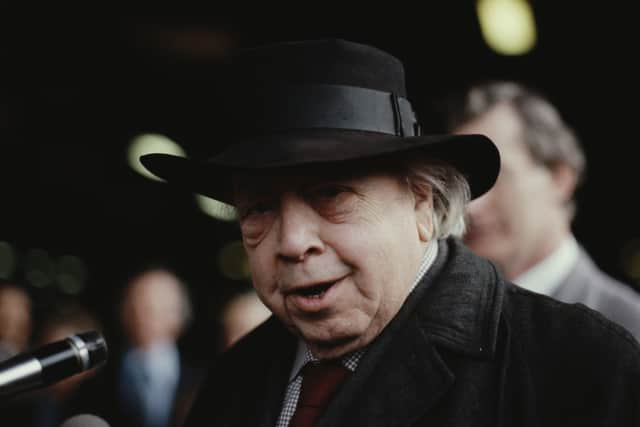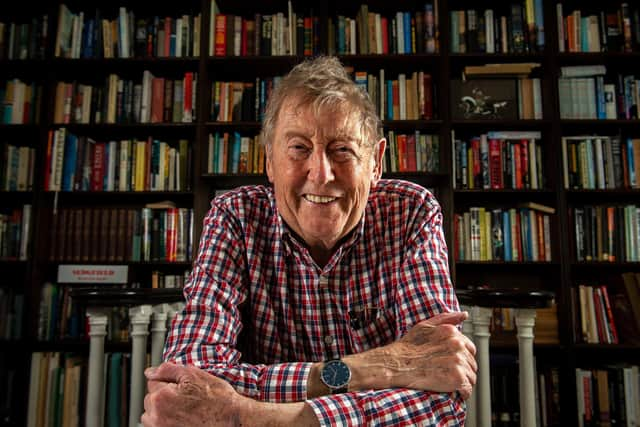JB Priestley’s lost world of bombs, broadcasts and Bradford pie shops


They reveal a lost world of make-do-and mend, of tongue sandwiches, Bradford pie shops and, most significantly, a destructive power struggle with Churchill and the BBC.
Austin Mitchell, the former MP and Calendar presenter, and a kindred Socialist spirit of Priestley’s, said it was hard to underestimate his importance to maintaining morale as the bombs started falling on London and then Sheffield, Hull and across Britain.
Advertisement
Hide AdAdvertisement
Hide Ad“When other correspondents were writing about the bombs, he was describing the people and the privations of war,” said Mr Mitchell, whose book, Britain Speaks: JB Priestley Broadcasts to the World, is published next week by Great Northern Books.


“He was an ordinary person, a man of the people. His voice was completely different to the upper class, received pronunciation of the BBC.”
A veteran from Bradford of the First World War, Priestley was already a national figure when he was invited to begin his series of Postscript broadcasts after the withdrawal from Dunkirk.
His best-selling picaresque novel, The Good Companions, had spawned a film – and his English Journey, a polemic on the social scars left by the Great War, was already a classic. But his evocation of the “little ships” that plucked soldiers from the jaws of defeat in 1940 immortalised the conflict for generations to come.
Advertisement
Hide AdAdvertisement
Hide Ad“There were people in the studio in tears,” Mr Mitchell said.
Priestley had not been much of a broadcaster before then, but “he came from a good, solid Yorkshire background – his father was a socialist and so was he, and he could identify with people”, Mr Mitchell added. “He gave propaganda a credibility it didn’t have before.”
It was the influence of a rival propagandist, the Nazi sympathiser William Joyce – Lord Haw Haw – whose huge audience in Britain prompted the BBC to mobilise Priestley for a counter attack. In his first broadcast following the start of the London Blitz in September 1940, he spoke of “the colossal panorama of a defiant city”.
He broadcast live and few recordings exist, but the surviving scripts reveal an abiding Socialist agenda.
Advertisement
Hide AdAdvertisement
Hide Ad“He alienated Churchill, who wasn’t trying to balance the needs of war with society afterwards – and he was taken off national radio,” said Mr Mitchell, noting that the PM had felt “competitive” towards Priestley. He was replaced by, amongst others, TS Eliot, who was deemed “unreliable” and Duff Cooper, the Minister of Information, whose lecture on Joan of Arc was judged “among the most boring ever broadcast”.
Priestley, meanwhile continued to he heard overseas, and regaled audiences with such tales of wartime life as that of a butcher in his home city whose pies had survived his windows being blown out. His expenses claims also survive – 6s 3d for a whiskey and tongue sandwiches in Leeds – next to which the censor had scrawled “cheap”.
The JB Priestley Society, which keeps the torch burning for Bradford’s most celebrated literary son, said his work stood as an important commentary on wartime life.
The group’s chairman, Lindsay Sutton, said: “More than 16m listened to his weekly broadcasts in Britain alone.
Advertisement
Hide AdAdvertisement
Hide Ad“Priestley was a great patriot, but not just a jingoistic flag waver. He had been injured severely in the First World War and was then disillusioned with the post-war settlement.
“But he was acutely aware of keeping up morale at home, while trying to encourage the Americans to join the battle against Hitler.”
Support The Yorkshire Post and become a subscriber today.
Your subscription will help us to continue to bring quality news to the people of Yorkshire. In return, you’ll see fewer ads on site, get free access to our app and receive exclusive members-only offers.
So, please – if you can – pay for our work. Just £5 per month is the starting point. If you think that which we are trying to achieve is worth more, you can pay us what you think we are worth. By doing so, you will be investing in something that is becoming increasingly rare. Independent journalism that cares less about right and left and more about right and wrong. Journalism you can trust.
Thank you
James Mitchinson
Comment Guidelines
National World encourages reader discussion on our stories. User feedback, insights and back-and-forth exchanges add a rich layer of context to reporting. Please review our Community Guidelines before commenting.